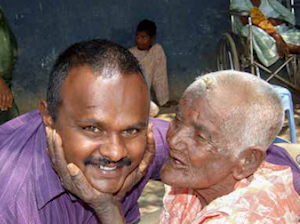
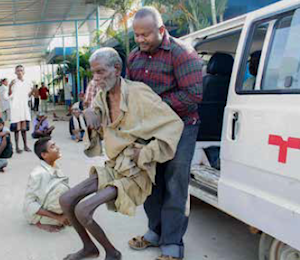
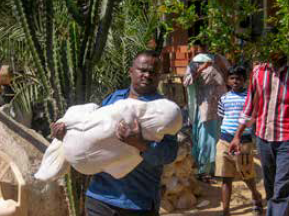
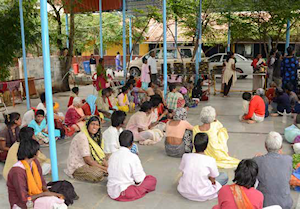
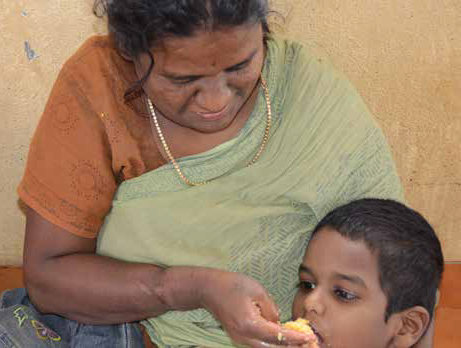
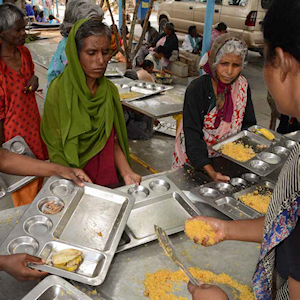
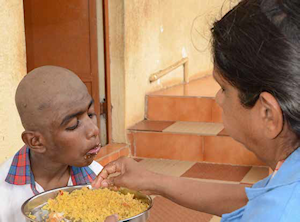
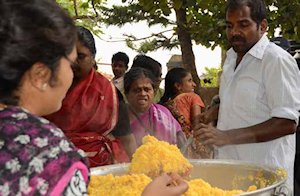
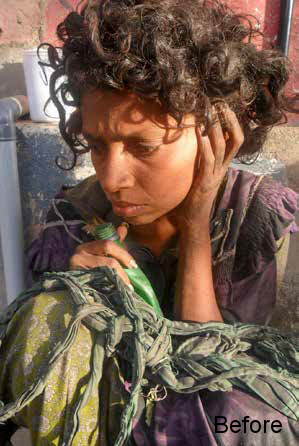
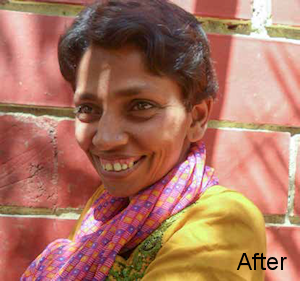
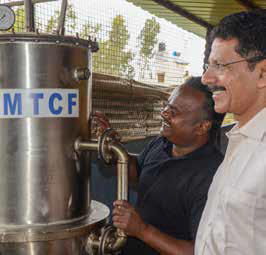
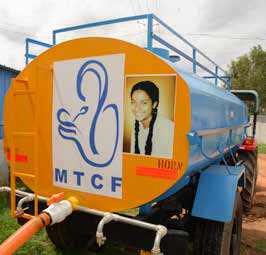
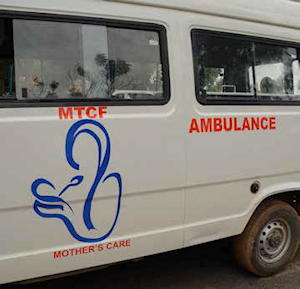
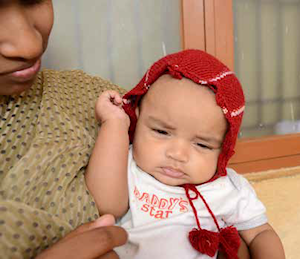
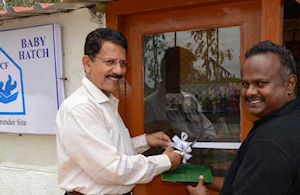
Rescued from the streets of Bangalore
Mother Teresa Children's Foundation financially supports the feeding of approximately 450 people every day living in the "Homes of Hope" located in Bangalore, India. Three facilities are there: one for men, another for women and a third for children with special needs. The men's facility has about 190 occupants. The women's facility currently houses 250, and the children's mission home has 30 orphans or abandoned adolescents and babies in its care.
The mission is a haven for the lost and forgotten of India. People who are dying or suffering from a vast number of physical and mental issues are picked up off the streets of Bangalore and brought into the mission. The goal is to deliver compassionate care until they die.
They are mentally and physically disabled, elderly, frail and mentally ill. All of them have one thing in common. Before being rescued through the "Homes of Hope" program, they were deserted and forgotten.
In addition to on-going monthly support, MTCF also provided funding for an ambulance that is used to rescue and transport the sick and dying off of the streets to the "Homes of Hope."
Typically, when people are rescued, their skin is caked with dirt, mud, oil and grit from living on the streets. Many have open wounds and skin lesions and are covered with maggots and Lice. On arrival, they are bathed and dressed in clean clothing. They receive medical care, are hydrated and if able to eat, start a nutrition program. Some die quickly. Others are rehabilitated. Those with non-life threatening mental or physical disabilities, but unable to survive independently, continue to live on premise. Because of the on-going financial support from MTCF, these people have a safe, clean place to call home.
Many who live at the mission are unable to walk, and shuffle on their hands and knees. Some are in wheelchairs or use walkers. Others rely on crutches. Numerous people are clearly suffering from mental illness and sit and rock, or wander around aimlessly. Others have lost control of both their physical and mental function. The staff is caring and compassionate. It is a gritty, hands-on experience for those who work here, as they manage several hundred people in various stages of life and death.
Project Achievements
In the last fifteen years, more than 4500 suffering people have been rescued and brought in for care. An ambulance paid for and sponsored by MTCF drives the streets of Bangalore and picks up destitute, sick and dying souls. The local leader there says that up to ten people per day are delivered to their doorsteps needing rescue. Here, they live out their final days in the care of the compassionate staff. On average, two to three people die each day here.
"The man who started Homes of Hope is one of my heroes," said MTCF president, Dr. Sajan George Kavinkalath. "He is hands-on, serving the people every day."
A doctor is on site at each mission location for two hours each day. Nurses are staffed around the clock. A team of thirty people operate all three facilities.
Thanks to MTCF financial support, 450 adults receive three meals per day served to them in the mission homes. It is a monumental task to prepare the meals. Mission staff goes to market twice weekly to buy vegetables and other supplies. Every month, the men and women consume about three and a half tons of rice and 200 kg. of sugar.
A typical day begins with coffee in the morning. Breakfast may be Chapatti, an Indian bread or Chitranna. A typical lunch is gram Curry and rice or perhaps greens with Masala. For dinner, they are served items like rice with either an egg curry or with vegetables. In the evening, they have coffee with biscuits. Only the patients who are gravely ill and dying receive milk.
Typical staples for the kitchen include rice, soji, wheat flour, red chili, green peas, tea and coffee powder, bengal and bean gram, oil, sugar and various spices.
Kitchen Renovation
An additional project achievement with significant impact has been the remodel of the kitchen facilities in the main mission kitchen, located in the women's home.
The renovation, funded by MTCF, includes all new equipment and a redesign to make better use of space. The kitchen now features food grinders, new commercial size cook tops and other appliances specifically fabricated and designed to meet the needs of the mission.
In addition, the kitchen which used only wood for cooking now also includes steam heat and gas for fuel. The commercial size appliances and oversized sinks allow kitchen staff to prepare food in mass quantity for up to 2,000 adults.
"The modernization of the kitchen has made operations much more efficient and also improved overall hygiene, as there is much less food handling," said Sajan George Kavinkalath, president of MTCF, who assisted with the logistics of the renovation.
Tractor and storage tanker
MTCF also recently provided funding for the purchase of a tractor and portable storage tanker. This purchase has had a monumental impact on daily life. Each day the vehicle makes eight round trips to purchase and transport clean water to the homes. Prior to the grant for the purchase of the tractor and storage tanker, trucks had to be hired to purchase and transport water. The system was unreliable, as the trucks would often not show up when requested. The mission would completely run out of water. The tractor purchased by MTCF is also used by the mission for small farming operations, such as clearing and tilling.
Clean water is critical and in short supply in many regions in India. The homes have three bore wells on site, but the yield is low and not sufficient to meet the needs of all the program beneficiaries and staff. Because of this, MTCF has also funded water storage tanks at the mission homes. When the tractor arrives with fresh water, it flows from the tractor/tanker through large hoses into the water storage facilities. The largest tank made possible through MTCF has the capacity to store one hundred thousand liters of water. The other tanks provided by MTCF store about forty-five thousand liters of water. The most recently constructed tank sits atop the Children's home.
MTCF has also provided funding for rainwater harvesting, which creates an on-site water source for things like washing and cleaning.
Child Abandonment
Child abandonment is an increasing problem in India and Bangalore is no exception. Babies and children have been found in the garbage. Remains have also been discovered in other areas where babies are left to die and then devoured by hungry packs of stray dogs roaming the streets.
In response, MTCF has teamed with a local partner to open Baby Hatch. On August 7, 2012, the MTCF safe surrender site was officially inaugurated with a ribbon cutting conducted by MTCF president, Dr. Sajan George Kavinkalath. The Baby Hatch safe surrender site is a separate, stand alone building that has been constructed directly in front of the New Ark Mission children's home. It is approximately 64 square feet. Inside, a cradle with soft blankets wait for an unwanted baby. A sign on the exterior featuring the MTCF logo reads," Safe Surrender Site. The door is unlocked and staff is ready to receive and love any unwanted baby or child.
"My life-long goal is to extend this type of service into every city in India. No one should die alone in the streets. We all deserve a place where we can experience love and die with dignity," says the founder of the Homes of Hope.